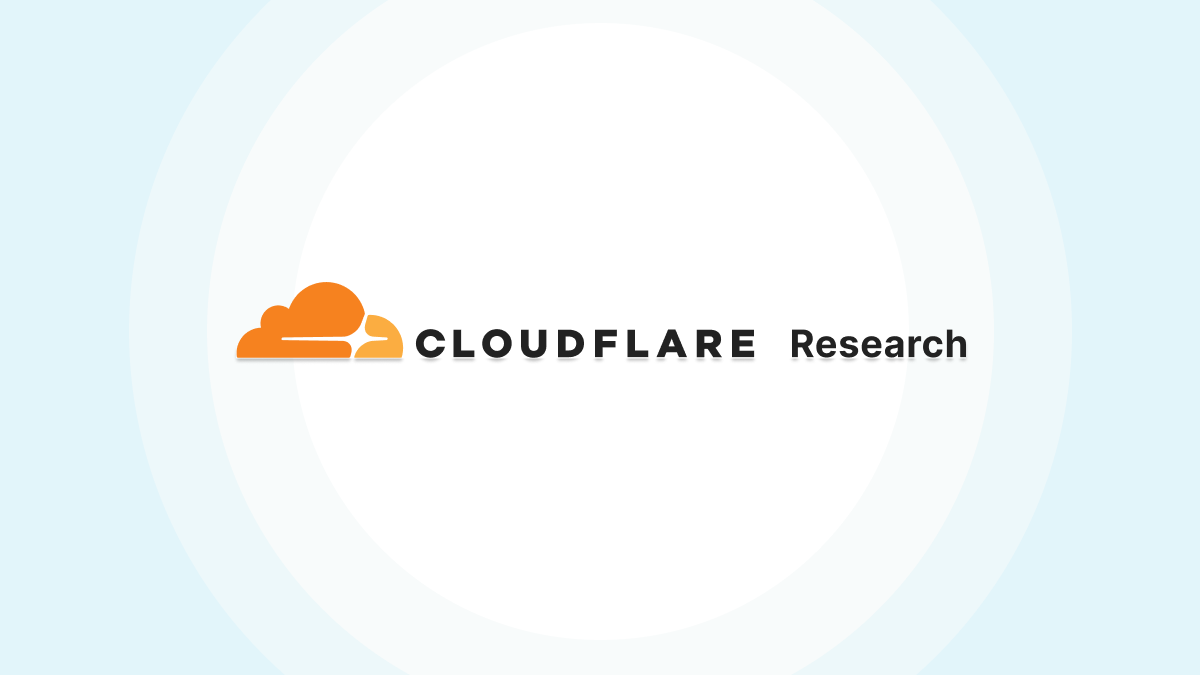Post Syndicated from Vânia Gonçalves original https://blog.cloudflare.com/announcing-cloudflare-research-hub/


As highlighted yesterday, research efforts at Cloudflare have been growing over the years as well as their scope. Cloudflare Research is proud to support computer science research to help build a better Internet, and we want to tell you where you can learn more about our efforts and how to get in touch.
Why are we announcing a website for Cloudflare Research?
Cloudflare is built on a foundation of open standards which are the result of community consensus and research. Research is integral to Cloudflare’s mission as is the commitment to contribute back to the research and standards communities by establishing and maintaining a growing number of collaborations.
Throughout the years we have cherished many collaborations and one-on-one relationships, but we have probably been missing a lot of interesting work happening elsewhere. This is our main motivation for this Research hub of information: to help us build further collaborations with industrial and academic research groups, and individuals across the world. We are eager to interface more effectively with the wider research and standards communities: practitioners, researchers and educators. And as for you, dear reader, we encourage you to recognize that you are our audience too: we often hear that Cloudflare’s commitment to sharing technical writing and resources is very attractive to many. This site also hopes to serve as a starting point for engagement with research that underpins development of the Internet.
We welcome you to reach out to us and share your ideas!
How we arrived at the site as it is
The opportunity to create a new website to share our growing library of information led us to an almost reflexive search for the right blog hosting system to fit the need. For our first prototype we gave the Docusaurus project a try. A few questions led us to evaluate our needs more carefully: does a static site need to use much JavaScript? Was an SPA (Single Page Application) the best fit and did we need to use a generic CSS framework?
Having this conversation led us to re-examine the necessity of using client-side scripts for the site at all. Why not remove the dependency on JavaScript? Cloudflare’s business model is based on making websites faster, not on tracking users, so why would we require JavaScript when we do not need much client-side dynamism? Could we build such an informational site simply, use tools easily inspectable by developers and deploy with Cloudflare Pages from Github?
We have avoided the use of frameworks, keeping our HTML simple and avoided minification since it is not really necessary here. We appreciate being able to peek under the hood and these choices allow the browser’s “View Page Source” right-click option on site pages to reveal human-readable code!
We did not want the HTML and CSS to be difficult to follow. Instead of something like:
<article class="w-100 w-50-l mb4 ph3 bb b--gray8 bn-l">
<p class="f3 fw5 gray5 my">September 17, 2021 2:00PM</p>
<a href="/tag/another/" class="dib pl2 pr2 pt1 pb1 mb2 bg-gray8 no-underline blue3 f2">Another</a>
...
</article>
where CSS classes are repeated, again and again, in source code we decided to lean on the kind of traditional hierarchical style declarations that put the C for “Cascading” in CSS.
We questioned whether in our serving of the site we needed to force the browser to re-check for content changes on every page visit. For this kind of website, always returning "max-age=0, must-revalidate, public" didn’t seem necessary.
The research.cloudflare.com site is a work in progress and embraces standards-based web development choices. We do not use JavaScript to enable lazy loading of images but instead lean on the loading attribute of the img tag. Because we do not have many images that lie beneath the fold it is okay for us to use this even as some browsers work to add support for this specification. We use the limited standardized CSS variable support to avoid needing a style pre-processor while still using custom colour variables.
Many times dynamic frameworks need to introduce quite complex mechanisms to restore accessibility for users. The standards-based choices we have made for the HTML and CSS that compose this site made a 100 accessibility score in Lighthouse (a popular performance, accessibility, and best practices measure) more easily achievable.
Explore and connect
While we wanted this website to be clean, we certainly didn’t want it to be empty!
Our research work spreads across multiple areas from network security, privacy, cryptography, authentication, Internet measurements, to distributed systems. We have compiled a first set of information about the research projects we have been recently working on, together with a handful of related resources, publications, and additional pointers to help you learn more about our work. We are also sharing results about the experiments we are running and code we have released to the community. This research work results in many cases from collaborations between multiple Cloudflare teams and industry and academic partners.
And, as will be highlighted during this week, you can learn more about our standardisation efforts, how we engage with standards bodies and contribute to several working groups and to shaping protocol specifications.
So, stay tuned, more is coming! Subscribe to our latest updates about research work and reach out if you want to collaborate with us. And if you are interested in joining the team, learn more about our career and internship opportunities and the visiting researcher program.